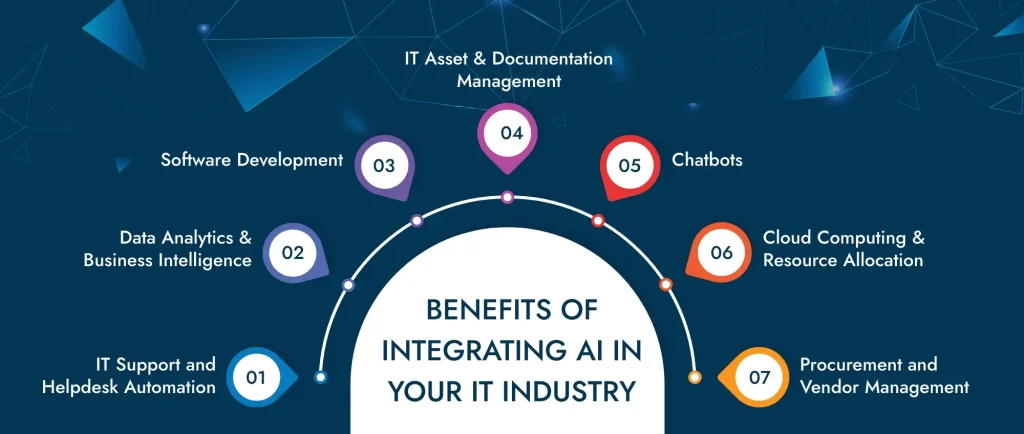Between endless opportunities and persistent competition, many young technology companies are standing in a critical position. What’s the best way for them to make themselves unique from other competitors who are also after the same market? How can they stay strong in the face of changing challenges? The most important question is how these entities can encourage innovation and growth.
Start-up owners may find themselves faced with the challenging task of maneuvering through resource constraints, market competition, scaling hurdles as well as regulatory challenges. Nevertheless, artificial intelligence (AI) provides a solution that is powerful enough for them to confidently confront these challenges. This article discusses the benefits of AI in information technology.
Why Does AI in Information Technology Matter?
For quite some time now, artificial intelligence has been around. The advent of AI has radically shifted how repetitive tasks are handled within the IT industry. Robotic Process Automation (RPA) allows for the automation of ordinary and repetitive tasks so that valuable human resources are freed up to focus on more strategic and creative activities that enhance efficiency while significantly reducing chances for errors.
Chatbots and voice-activated systems like AI-powered virtual assistants have revolutionized customer service in the IT industry. AI matters immensely in information technology because it drives efficiency, enhances decision-making, improves customer service, and promotes cybersecurity.
7 Benefits of Integrating AI in your IT Industry
Artificial intelligence is revolutionizing the industry through task automation. This shift increases efficiency and empowers IT experts to dedicate more time to innovation and strategic development.
Here are some of the benefits of AI in information technology:

1. IT Support and Helpdesk Automation
IT support and helpdesk automation revolutionize user assistance and issue resolution. A user who experiences a technical problem can go to a self-service website or chatbot for a support request. The system automatically categorizes and prioritizes the problem based on its severity and nature.
Automated responses provide immediate solutions for common issues, reducing resolution times significantly. If humans must intervene to address a problem, the ticket will be redirected by the system to the appropriate IT staff member, leading to a quick but accurate response.
Generally, this automation improves overall service efficiency and helps IT professionals deal with complex tasks while being responsive, thus making the IT support ecosystem user-friendly.
2. Data Analytics & Business Intelligence
The applications of artificial intelligence (AI) have transformed data analytics as well as business intelligence. AI-driven algorithms enable organizations to extract valuable insights from large volumes of complex data sets, thereby discovering trends, patterns, and correlations that might otherwise remain hidden.
These insights facilitate data-driven decision-making across various business functions. Market changes, customer behaviors, operational needs, etc can all be predicted by AI-powered predictive analytics, hence helping businesses anticipate future trends. Also, different types of prescriptive analytics provide business teams with recommendations for optimizing their work and improving production effectiveness.
AI in business intelligence can visualize data, automate report creation, and extract more meaning from historical data. With AI’s natural language processing (NLP), users can ask questions about data as though they were speaking to another person – making it easier for non-technical audiences to access the data.
READ: Data Analytics Consulting Helps Small Businesses to Grow
3. Software Development
AI for IT startups has simplified writing software programs by automatically generating code instead of manually performing this task. The computer algorithms used in AI analyze code patterns, allowing them to create mini codes, thus reducing the time spent designing routine program tasks.
This shortens the development cycles, enabling programmers to shift their attention to more difficult and creative aspects of code writing. This AI-powered code writing also helps to maintain a consistent coding standard at all times throughout the codebase. It is important to note that such an application of AI will improve productivity while reducing errors and enabling software developers to produce high-quality code faster.
4. IT Asset & Documentation Management
Augmented by artificial intelligence (AI), IT asset management is crucial for effectively managing and optimizing the IT resources of an organization. This includes tracking and controlling IT assets through their whole lifecycle, such as hardware, software, and licenses.
Artificial intelligence automates the detection process of assets, keeps track of usage trends, and forecasts when fixes or replacements are necessary for them. In so doing, IT professionals have accurate stock records, thus minimizing chances of under-utilization or unwarranted expenditures, which translates into significant savings.
5. Chatbots
Immediate answers from AI-driven chatbots are changing the face of information technology support. Hence, these chatbots can understand users’ requests with NLP (natural language processing) without wasting time on troubleshooting problems but instead see how quickly they can fix them.
So this speeds up support processes significantly, reducing response times substantially and leading to a good user experience. Thus, chatbots care for common inquiries while freeing human agents from mundane tasks, improving overall support performance.
According to Forbes Advisor, ChatGPT was the most talked about innovation in Artificial Intelligence during the 2022 fall season; within five days after its launch in November 2022, it attracted over one million users. Based on several reports, it has increased productivity by 14% among tech companies’ staff through AI applications, confirming the readiness of IT to incorporate AI.
With their ability to learn iteratively, they gain effectiveness as they evolve and adapt better to users’ changing needs, enhancing the quality of IT support services. As a result, it provides fast and accurate technical assistance thus leading to high customer satisfaction rates thereby making an IT infrastructure more flexible and agile.
6. Procurement and Vendor Management
AI in information technology procurement and vendor management uses artificial intelligence to improve the acquisition of AI development services and IT products from external suppliers. Organizations need to leverage data when selecting vendors, optimizing contract terms and pricing, tracking costs, assessing the performance of vendors, and managing the risks involved.
Automating routine activities while providing actionable insights based on service level agreements (SLAs) and contractual terms are ways that AI helps organizations reduce costs while increasing efficiency with strong vendor relationships.
7. Cloud Computing and Resource Allocation
This enables faster cloud computing optimization by applying AI approaches to resource allocation in cloud infrastructure, enhancing how efficiently this can be done at a low cost. For example, these systems powered by artificial intelligence continuously analyze workload profile demands and other resource consumption patterns alongside key performance indicators (KPIs) to optimize CPU time allocation and memory utilization, including storage capacity, where necessary.
Real-time matching between demand levels for resources available for supply leads to significant savings by avoiding under-utilization or over-provisioning thereby enhancing application performance. Similarly, AI recognizes ways to save costs, such as proposing more affordable types or advising on storage usage optimization in the cloud.
Through this, cloud computing platforms’ scalability, cost-effectiveness, and dependability are improved; hence, organizations meet their IT needs while retaining control over expenditure on the cloud. Successful implementation involves integrating cloud management platforms with regular adjustments to accommodate changing workloads and resource demands.
Transform Your IT Startup with AI Solutions
Implement AI to drive innovation and efficiency in your IT business. Let’s get started.
3 Challenges IT startups face while choosing the right AI solution
Adopting AI in information technology offers startups a significant edge but comes with several challenges. Here are three critical obstacles startups often encounter when integrating AI into their IT infrastructure:
Startups must handle massive volumes of data to train AI models effectively. Ensuring the data is accurate, clean, and relevant is daunting. Inadequate or poor-quality data can lead to accurate predictions and reliable AI outputs.
94% of data, privacy, and security professionals prioritize compliance with data privacy regulations within their organizations. With increasing data privacy regulations like GDPR and CCPA, startups must ensure their data management practices comply with legal standards. Mishandling personal or sensitive information can result in hefty fines and damage to the company’s reputation. Startups need robust systems to store and integrate data from various sources.
Managing data silos and ensuring seamless data flow between different departments and applications is essential for effective AI implementation.
The AI landscape evolves quickly, with new algorithms, tools, and frameworks emerging regularly. Startups often need help to keep pace with these advancements, which can make their AI solutions obsolete if not continually updated.
Advanced AI technologies often require significant hardware, software, and investment from skilled personnel. Typically operating with limited budgets, startups may need help to allocate resources for cutting-edge AI infrastructure.
Implementing AI requires machine learning, data science, and software engineering expertise. Finding and retaining talent with these specialized skills can be difficult for startups that need brand recognition or resources to attract top professionals.
Moving to the cloud is often necessary for leveraging AI effectively, but this migration can be complex and resource-intensive. Startups must ensure their data is securely and efficiently transferred to cloud platforms without disrupting business operations.
Choosing the right AI and cloud service providers is crucial. Startups must evaluate vendors based on their technological capabilities, cost, reliability, and support services. Managing relationships with multiple vendors and ensuring they meet the startup’s evolving needs can be challenging.
Startups need AI solutions that can scale with their growth. However, not all vendors offer the flexibility to adapt to changing business needs. Startups must carefully assess whether potential vendors can provide scalable solutions that align with their long-term objectives.
READ: Cloud Migration Consultancy Services for Your Businesses
Empower Your IT Business with AI Expertise
Adopt AI to stay ahead in the competitive IT landscape. See how we can help.
How Can ViitorCloud Overcome IT Challenges with an AI solution?
Ready to take your information technology startup to the next level?
Adopting AI isn’t just an option—it’s the game-changer you need. From automating routine tasks to delivering advanced data analytics, AI is the key to unlocking efficiency, optimizing resources, and driving innovation. Imagine transforming customer interactions and securing cybersecurity, all while setting your startup on a path to sustainable growth and a competitive edge.
At ViitorCloud, we don’t just offer AI development services; we provide tailored solutions that address the unique challenges of IT startups. We’re here to help you harness the full benefits of AI in information technology. With ViitorCloud by your side, you’re not just adopting AI—you’re adopting the future. Partner with us, and watch your startup thrive in today’s dynamic tech landscape.
Ready to see the difference? ViitorCloud’s AI solutions are just what your startup needs.
Frequently Asked Questions
AI is used in IT for automated network monitoring, which detects and resolves issues in real-time, enhancing system reliability and reducing downtime.
Major companies like IBM, Google, Microsoft, and Amazon are leading the AI advancements in information technology, offering innovative AI-driven solutions and services.
AI automates repetitive tasks, enhances cybersecurity, optimizes resource allocation, provides predictive maintenance, and improves data management.
AI helps the IT industry by increasing efficiency, reducing costs, enhancing security, enabling advanced data analytics, and automating routine processes, allowing professionals to focus on more complex tasks.

Vishal Patel
Vishal Patel is an experienced Solution Consultant with a proven track record in the information technology and services industry.
